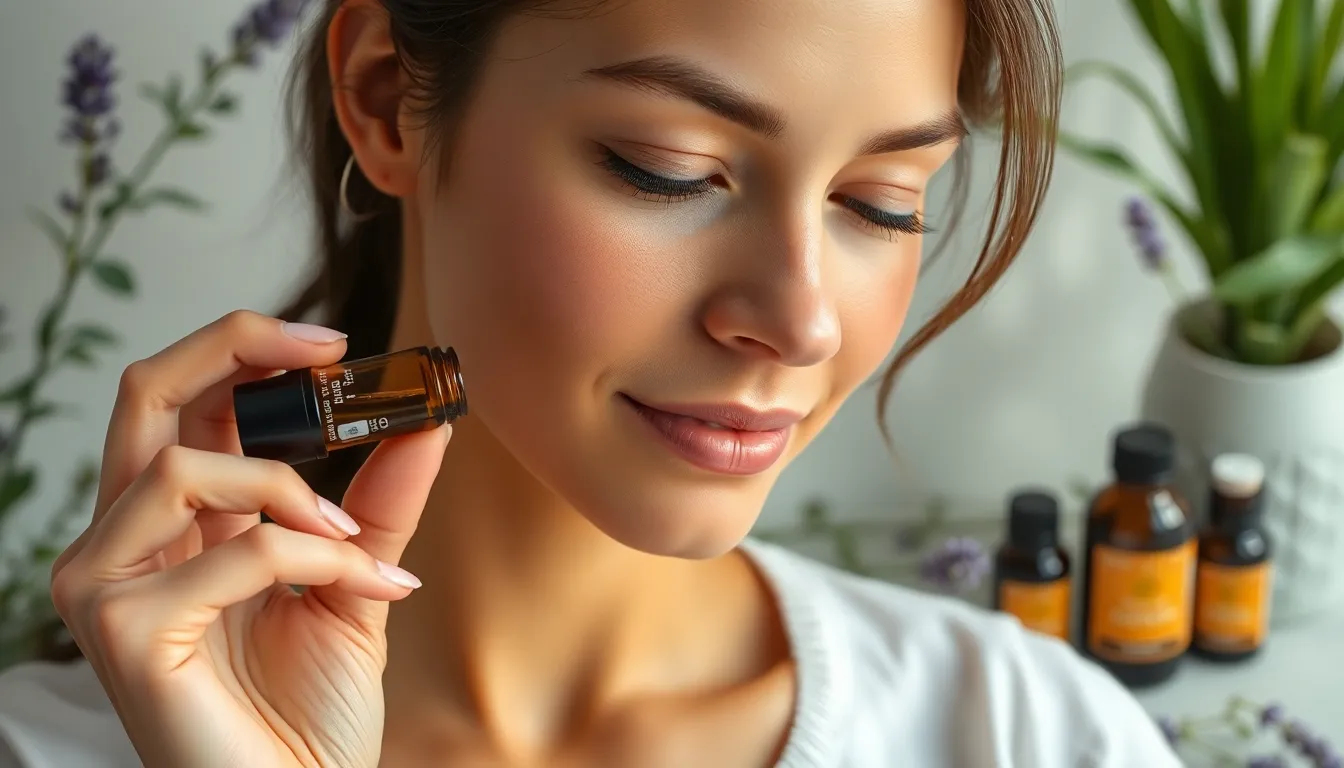Table of Contents
ToggleImagine a world where your skin glows like a well-polished apple and feels as smooth as a baby’s bottom. Sounds dreamy, right? Well, essential oils might just be the magic potion you’ve been searching for. These little vials of nature’s goodness pack a punch, offering everything from hydration to anti-aging benefits.
Overview of Essential Oils for Skin
Essential oils offer numerous benefits for skin care routines. Many oils possess hydrating properties, helping to maintain moisture levels for healthier skin. Lavender oil soothes irritation and promotes overall relaxation. Tea tree oil contains antimicrobial properties, making it effective for acne-prone skin.
Other oils, such as jojoba oil, closely resemble the skin’s natural sebum, providing excellent hydration without clogging pores. Frankincense oil promotes cell regeneration and improves skin tone, making it a popular choice for anti-aging treatments. Additionally, rosemary oil enhances blood circulation, which supports a vibrant complexion.
Using essential oils often requires dilution with a carrier oil, ensuring safety and effectiveness. A blend of a few drops of essential oil in a tablespoon of coconut oil creates a nourishing skin treatment. Skin types may vary, so patch testing on a small area is advisable before broader application.
According to research, essential oils can reduce signs of aging and improve skin texture. For instance, bergamot oil helps even skin tone and brightens dull complexions. Incorporating these oils into a daily skincare regimen can enhance the benefits of traditional products.
Different oils suit various skin concerns, making it crucial to choose wisely. He or she might select sandalwood oil for its anti-inflammatory effects or chamomile oil to calm eczema flare-ups. Exploring essential oils empowers individuals to personalize their skincare methods, leading to improved skin health and appearance.
Benefits of Essential Oils for Skin

Essential oils provide several benefits for skin health and appearance. They play a key role in hydration, possess antimicrobial properties, and demonstrate anti-aging effects.
Hydration and Moisture
Essential oils help maintain skin hydration and moisture. Oils like jojoba mimic natural skin oils, providing deep moisture without clogging pores. Lavender oil offers calming effects while promoting hydration. Tea tree oil contains compounds that help regulate oil production, preventing dryness. Users notice improvements in skin texture and hydration with consistent use. Incorporating these oils into daily routines enhances the skin’s overall moisture levels.
Antimicrobial Properties
Essential oils possess important antimicrobial properties. Tea tree oil effectively targets bacteria, making it ideal for acne-prone skin. Lavender oil exhibits antifungal effects, protecting against skin infections. Rosemary oil stimulates circulation, promoting a healthy, clear complexion. These oils can reduce the risk of breakouts while soothing irritation. Using essential oils can create a protective barrier on the skin.
Anti-Aging Effects
Essential oils also contribute to anti-aging benefits. Frankincense oil stimulates cell regeneration, helping reduce the appearance of fine lines. Geranium oil improves skin elasticity, promoting a youthful look. Lavender oil aids in healing, addressing signs of aging. Research shows that essential oils improve skin texture and tone, enhancing overall appearance. Regular application supports a more radiant and youthful complexion.
Popular Essential Oils for Skin
Various essential oils provide unique benefits for skin health and beauty. Here are some popular choices.
Lavender Essential Oil
Lavender essential oil excels in soothing skin irritations and promoting relaxation. Its anti-inflammatory properties help reduce redness and calm irritation. People often use lavender for its ability to maintain moisture, making it effective for dry skin. Aromatherapy benefits accompany topical use, enhancing overall well-being. Studies show that lavender oil can also promote wound healing and prevent scarring when applied correctly. This versatile oil works for multiple skin types, ensuring broad appeal.
Tea Tree Essential Oil
Tea tree essential oil stands out for its potent antimicrobial properties. Many people use it to combat acne due to its effectiveness against acne-causing bacteria. Its natural astringent properties aid in reducing excess oil production, thus preventing breakouts. In addition to targeting acne, tea tree oil works on minor cuts and infections, accelerating healing. Proper dilution with a carrier oil is essential to minimize skin irritation, ensuring safe application. Overall, it’s a must-have in any acne-fighting skincare regimen.
Frankincense Essential Oil
Frankincense essential oil plays a significant role in anti-aging skincare. It promotes cell regeneration and improves skin elasticity, making it invaluable for mature skin. Users find that it fades scars and dark spots, leading to a more even skin tone. This oil adds a luxurious aroma to skincare routines, enhancing the experience. Incorporating frankincense into a routine supports a youthful glow and helps maintain skin vitality. Dilution remains crucial for maximum effectiveness and safety.
How to Use Essential Oils for Skin
Using essential oils effectively enhances their benefits for skin health. Diluting essential oils with carrier oils ensures safety and maximizes their potential.
Dilution and Carrier Oils
Dilution plays a crucial role in using essential oils. It’s important to mix essential oils with carrier oils like jojoba, coconut, or almond oil. This ratio generally involves one to two drops of essential oil per teaspoon of carrier oil. Choosing high-quality carrier oils preserves the effectiveness of the essential oils while minimizing irritation. Individuals with sensitive skin should consider further dilution, as this enhances safety during application.
Application Methods
Several methods exist for applying essential oils to the skin. Direct application involves using diluted oils on targeted areas, such as spots prone to dryness or irritation. Another option includes adding essential oils to skincare products, like lotions or creams, to boost their effectiveness. Lastly, incorporating oils into a bath can create a relaxing experience while nourishing the skin. Selecting the appropriate method depends on personal preference and specific skin concerns.
Safety Tips and Precautions
Diluting essential oils with carrier oils is crucial for safe application. Examples of carrier oils include jojoba, coconut, and almond oil. Using the appropriate ratio, typically one to two drops of essential oil per teaspoon of carrier oil, minimizes the risk of skin irritation.
Conducting a patch test before broader application is essential. Apply a small amount of the diluted essential oil mix on a less visible area, such as the wrist or inner elbow. This step assesses for any allergic reactions or sensitivity before using it on larger skin areas.
Consulting with a healthcare professional becomes important, especially for individuals with existing skin conditions. Pregnant women and those with specific health issues should seek professional advice before using essential oils. Certain oils might pose risks during pregnancy or interact adversely with medications.
Avoiding essential oils around sensitive areas is recommended. Areas such as the eyes, nose, and mucous membranes are particularly sensitive. In the event of accidental contact, rinse thoroughly with water and seek medical advice if irritation persists.
Choosing quality essential oils ensures safety and effectiveness. Verify that the chosen oils are pure and sourced from reputable suppliers. Essential oils labeled as natural may still contain additives that can irritate the skin.
Storing essential oils correctly contributes to their longevity. Keep oils away from direct sunlight and extreme temperatures, using dark glass containers when possible. Proper storage preserves their beneficial properties and extends their usability.
Monitoring skin reactions maintains skin health. If any irritation, redness, or discomfort occurs after application, discontinue use immediately. Identifying the specific oil causing the reaction is crucial for future use.
Exploring essential oils for skin care opens up a world of natural benefits. These oils can transform skincare routines through their hydrating and soothing properties. By selecting the right oils and using them safely, individuals can address specific skin concerns while enjoying a more radiant complexion.
Personalizing the application methods ensures that everyone can find what works best for their skin. With the right approach and attention to safety, essential oils can play a significant role in achieving healthy and youthful skin. Embracing these natural solutions might just be the key to unlocking the skin’s full potential.




